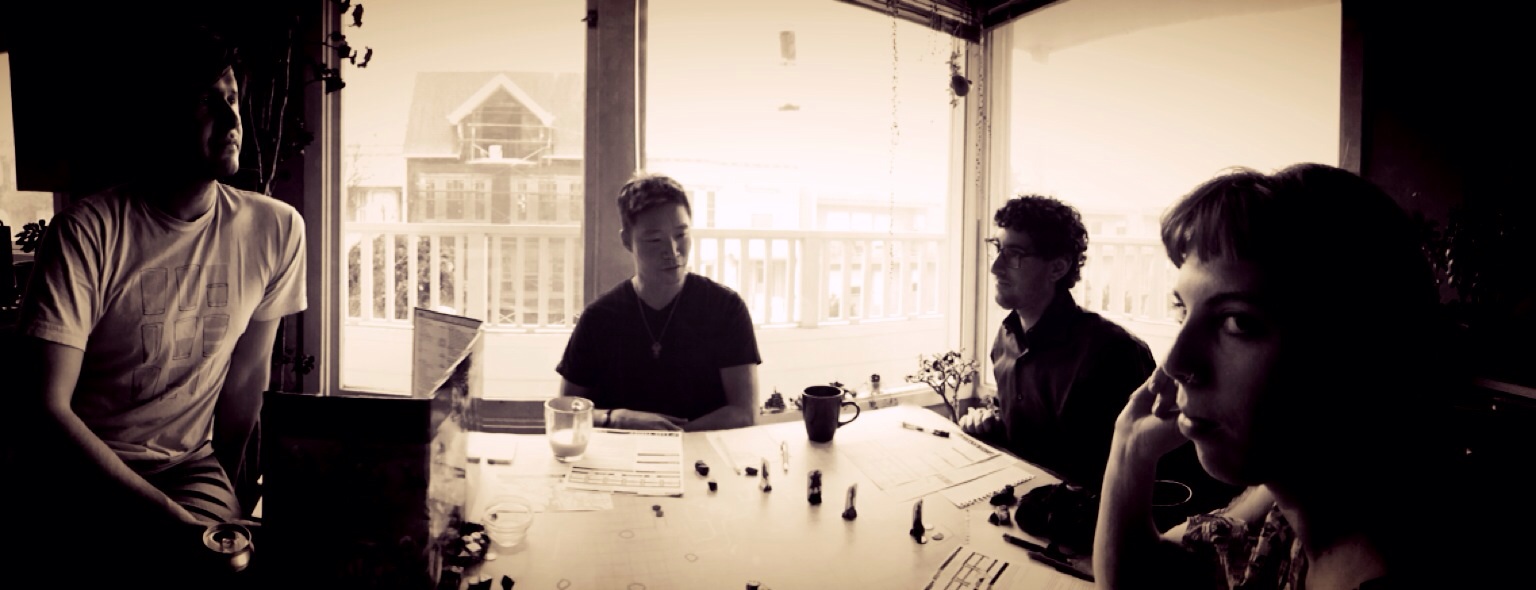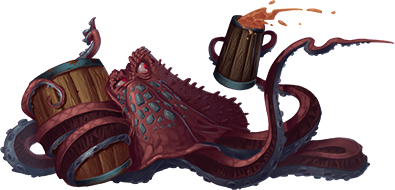Putting things on an even playing field is core to game design. Most games require you to believe that you’re facing an even playing field for you to consider taking part in them. It’s part and parcel to believe that a game should be balanced, so why do I say that balance is a myth in tabletop role-playing games (TTRPGs)? It has to do more with the definition of balance and its tyranny over enjoyment at the table than it does with the concept of actually achieving fairness.
Before we delve too deeply, allow me to share my definition of balance, as I want to keep the concept narrow. For the purposes of this article, we’ll be discussing balance as the idea of maintaining a 50/50 chance between win and loss in a game. I realize that the definition can be expanded wider than that, but we have to put some boundaries up to make sure we’re all talking about the same concept.
Striving for balance can often run counter to enjoyable sessions for you or the players at your table.
Another important caveat, this opinion is my own and no one else’s. I make no claims that I’m correct in my statement that balance is a red herring. I also want to be clear that I don’t believe that you should throw every overpowered item or monster at a party because nothing matters. Instead, I’m arguing that balance is a unicorn not worth chasing when there are other, more important, issues to consider when you’re a Hobby DM.
Balance for Zero Sum
When we talk about balance in terms of zero-sum games, the focus makes absolute sense. Zero-sum games can be defined as any condition where the gain of someone means a loss for someone else. An easy example of this would be poker, where everyone pays their buy in and the pot moves around the table via bets. Any game that has a winner and a loser at the end, such as chess, could be considered a zero-sum game.
It’s important to maintain an even playing field going into these types of games because each player must have an even starting point in order to have a fair chance at succeeding. Some elements can be left to chance, but it’s important that everyone has equal access to that chance. So here is where we need to consider what kind of game we are playing when we play a TTRPG.
Winning the Table
Concepts of victory and loss exist within all tabletops, but it’s much harder to pin down a direct zero-sum concept. When you vanquish a monster in combat, that could be counted as a win condition. It also doesn’t tip the scales of the game more towards you. Even the death of a character can’t be considered a loss condition as another character can take up their torch, or perhaps they can be resurrected.
Let’s consider a scenario where a bad guy is the target of the party’s ire from the start of the campaign. Over time, they work their way through minions and monsters, fighting their way towards uncovering the evil plot. They eventually find that the plot, though directly counter to them, comes from an understandable place and begin to view the villain as a sympathetic, but misguided character. They could evolve to even understand the villain’s point, though they don’t agree with the method or the end goal. Eventually they stand in opposition and strike down the villain they have come to understand. Technically, that would be a win condition, but it could cause a sadness in the party that wouldn’t be present in zero-sum victory.
We need to be careful when ascribing concepts from games that bear little resemblance to TTRPGs as if they are core to the game. There is no definable win condition for a TTRPG outside of having fun with your friends. For a thought exercise, let’s consider the reality of achieving balance in a popular TTRPG like Dungeons & Dragons (D&D).
Of Dogs & Cars
Chasing some semblance of balance in old D&D campaigns is something I’ve spent far too much time on. I would work to ensure the party had the recommended gold and number of magic items at various levels. I would strive to make sure each encounter has the proper Challenge Rating (CR) and put an untold amount of effort into making sure I hit the proper number of encounters per adventuring day.
I learned a lot about interesting game mechanics in that time frame. I recommend people try it at least once for a dungeon just to get a sense of all that you have to consider. The staggering amount of classes, subclasses, racial bonuses, feats, ability choices, spell choices, and so on built out to a game of playing whack-a-mole. Players would counter everything that I threw at them, no matter how much time and effort was put into the combat. There was no possibility to consider all the ways players in D&D could circumvent a challenge or combat.
I realized I was a dog chasing a car. Catching up would be impossible and even if I could catch up and achieve perfect balance, there was no way I could maintain it. You can’t catch lightning in a bottle. You can’t capture perfect balance without pouring half of your life into it. So, what are we the Hobby DMs of the world supposed to do? Just make interesting worlds instead.
Weight with Suggestion
Forget about balance for a second and think about a standard mid-fantasy world. Most of them have a wide range of threats from your basic goblinoids up to ancient deities bent on destroying the world. I submit you should simply make those worlds without worrying too much about what the party will do. Structure your worlds such that they make sense. Are there hill giants in the mountains just outside of your starter town? That’s okay to have. Worry about making an interesting and dynamic world that flows well together.
If you spend your time filling your world with interesting conflicts, balance will naturally fall in line as you prepare.
To get around these powerful enemies in areas that would be accessible to the party early, I suggest weighting what they do and pursue with suggestions from friendly NPCs. Place a good deal of townspeople that suggest to them that the giants are dangerous and not to be trifled with by all but the most powerful of warriors. If they ignore that and go on their way, perhaps plop down an obviously more powerful foe like an owlbear that they see the giants easily slay. This is another manner of suggestion by showing them the danger. If they still proceed, well I’m sorry but they’re going to get slapped for it.
Your time was better spent, though, preparing an interesting world with a realistic set of situations around. It’s okay for the party to get in over their head and retreat occasionally. It’s definitely okay to give the party straight knowledge by saying that they can see this foe is far greater than them. Don’t be afraid to make a world that makes sense without the need to balance it on a knife’s edge.
Combat Within Reason
The actual nuts and bolts of combat can require a fine tool to tailor them to your party. My suggestion for Hobby DMs is to stop worrying about if things are perfectly balanced. Instead, have an encounter planned with plenty of varied minions and the option to bring in more should you need to. Waves of enemies bringing in new threads can make for exciting combat where the party wonders how much they can hold out against. Keep bringing in waves until you see them spending slots and getting in trouble, then ease off.
If you have many waves planned out and things are going poorly due to dice or a monster that was more powerful than you expect, drop some enemies you were going to bring in. Creating larger encounters in this way allows the difficulty to adjust as the party continues to fight. You give yourself a lot of leeway when approaching combat in this manner. So much time and hassle to achieve balance can be ignored by just running waves on larger fights. Remember, though, you are in control of the flow of the game.
Bonus Combat Tip
Give yourself a hit point (HP) range to work with on your enemies. I’m sure some people will have my head for this, but I will often prepare my foes with a range that their HP could be in. Where their final HP falls depends on how the combat is going. I’ll put it on the low end if the players are struggling more than expected.
It’s Your World
I fully encourage players to take part in world-building with me, but ultimately I am in control of the moment to moment reactions of the world. Because of that amount of leeway, I simply prepare whatever makes sense to the context of the world without overly caring about balance. If the heroes are facing some rough challenges, I might ease back on some abilities I had planned for a monster. It’s fully without my right to do so and I’d argue it is your responsibility to handle those things on the fly.
Without focusing on true 50/50 balance, you may also find that the party is tearing through things too easily. This is when you build a puzzle into combat. Try to give them something that can’t simply be overcome with damage, such as a task that must be completed in a time or an area they have to reach before the door closes. Give them something to care about other than just tearing through hit points.
Scale your world to suit the players on the fly. If you spend most of your preparation time focused on balance, you’re going to find yourself in a never ending hole chasing an impossible goal. You can certainly take time to make sure items and foes aren’t completely out of the realm of acceptability. Just don’t put all your eggs into the myth of balance. We’re not playing a zero-sum game. The only time you win is when you’re all enjoying yourselves.



